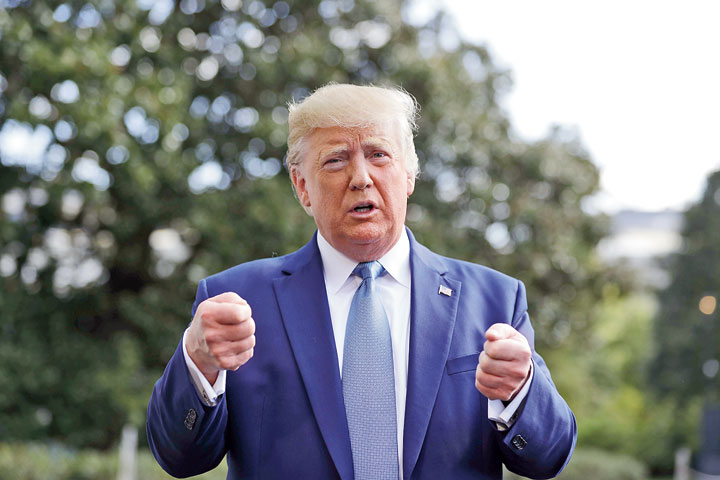A federal judge on Monday rejected a bold argument from President Trump that sitting Presidents are immune from criminal investigations, allowing the Manhattan district attorney’s office to subpoena eight years of the president’s personal and corporate tax returns.
Lawyers for Trump quickly told the court they would appeal the ruling from Judge Victor Marrero of Manhattan federal court. The President’s lawyers could not immediately be reached for comment.
In a 75-page ruling, Judge Marrero called the President’s argument “repugnant to the nation’s governmental structure and constitutional values”. Presidents, their families and businesses are not above the law, the judge ruled.
The judge’s decision came a little more than a month after the Manhattan district attorney subpoenaed Trump’s accounting firm, Mazars USA, for his personal and corporate returns dating to 2011. The demand touched off a legal showdown that raised new constitutional questions and drew in the justice department, which supported the President’s request to delay enforcement of the subpoena.
The Manhattan district attorney, Cyrus R. Vance Jr, has been investigating whether any New York state laws were broken when Trump and his company reimbursed the President’s former lawyer and fixer, Michael D. Cohen, for payments he made in the run-up to the 2016 election to the pornographic film actress Stormy Daniels, who had said she had an affair with Trump.
Trump has denied having an affair with Daniels.
Trump’s lawyers sued last month to block the subpoena, arguing that the Constitution effectively makes sitting Presidents immune from all criminal inquiries until they leave the White House. The lawyers acknowledged that their argument had not been tested in courts, but said the release of the President’s tax returns would cause him “irreparable harm”.
Vance’s office asked Judge Marrero to dismiss Trump’s suit, saying a grand jury had a right to “pursue its investigation free from interference and litigious delay” and rejecting his claim to blanket immunity. The judge was appointed by President Bill Clinton.
Trump’s lawyers have called the investigation by Vance, a Democrat, politically motivated.
Vance has accused the President and his team of trying to run out the clock on the investigation.
Last week, lawyers with Trump’s justice department jumped into the fray, asking the judge to temporarily block the subpoena while the court takes time to consider the “significant constitutional issues” in the case.
The justice department, led by attorney-general William P. Barr, did not say whether it agreed with Trump’s position that Presidents cannot be investigated. But, citing the constitutional questions, the department said it wanted to provide its views.
The Constitution does not explicitly say whether Presidents can be charged with a crime while in office, and the Supreme Court has not answered the question.
Federal prosecutors are barred from charging a sitting President with a crime because the justice department has decided that Presidents have temporary immunity while they are in office.
But in the past, that position has not precluded investigating a President. Presidents, including Trump, have been subjects of federal criminal investigations while in office.
Local prosecutors, such as Vance, are also not bound by the justice department’s position.
Vance’s office agreed not to enforce the subpoena until two days after Judge Marrero issued a ruling.
Writing to the judge late on Friday, William S. Consovoy, a lawyer for Trump, all but demanded that the judge rule early on Monday in order that there be time to appeal before the afternoon deadline.
“After 9am,” Trump’s lawyer wrote, “the President will not have enough time to seek relief from the Second Circuit before Mazars discloses his confidential information.”










